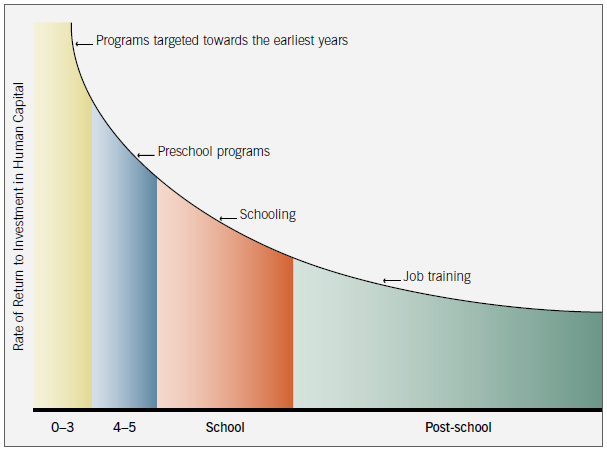Economic Return on Investment
 Economics of Human Potential Investing in quality early learning programs is the most efficient way to affect school and life success and to reduce social expenditures later, according to research by Prof. James Heckman, a Nobel laureate in economics from the University of Chicago. Returns are greatest for the most at-risk children. For that population in particular, quality early learning programs can result in reduced costs later on special education, remedial classes, and even incarceration. Heckman’s research also shows early interventions for disadvantaged children “raise the quality of the workforce, enhance the productivity of schools and reduce crime, teenage pregnancy, and welfare dependency. They raise earnings and promote social attachment.” Heckman contends, “The real question is how to use available funds wisely. The best evidence supports the policy prescription: Invest in the very young.” Read more about Dr. Heckman’s work at heckmanequation.org
Economics of Human Potential Investing in quality early learning programs is the most efficient way to affect school and life success and to reduce social expenditures later, according to research by Prof. James Heckman, a Nobel laureate in economics from the University of Chicago. Returns are greatest for the most at-risk children. For that population in particular, quality early learning programs can result in reduced costs later on special education, remedial classes, and even incarceration. Heckman’s research also shows early interventions for disadvantaged children “raise the quality of the workforce, enhance the productivity of schools and reduce crime, teenage pregnancy, and welfare dependency. They raise earnings and promote social attachment.” Heckman contends, “The real question is how to use available funds wisely. The best evidence supports the policy prescription: Invest in the very young.” Read more about Dr. Heckman’s work at heckmanequation.org
Early Childhood Development on a Large Scale Arthur J. Rolnick of the Federal Reserve Bank of Minneapolis writes that, “Careful academic research demonstrates that tax dollars spent on early childhood development provide extraordinary returns compared with investments in the public, and even private, sector. The potential return from a focused, high-quality early childhood development program is as high as 16 percent per year. Some of these benefits are private gains for the children involved in the form of higher wages later in life. But the broader economy also benefits because individuals who participate in high-quality early childhood development programs have greater skills than they otherwise would, and they’re able to contribute productively to their local economies.” Read more about Rolnick’s study.
